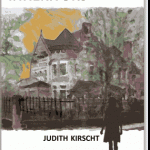To deal with conflicting cultures is to be American. If you’ve grown up and passed through adulthood without dealing with religious, national, racial, or social class conflict, you are probably unusual. I grew up–
- in an Ivory Tower community
- attended elementary school with children primarily from Appalachia
- in a city know as a great cultural center
- described as “Hog Butcher of the World” (Carl Sandburg).
Where do I belong? To all. Why has this “normal” diversity become so ugly?
In THE INHERITORS, I tried to bring alive my sense of Chicago, and set the story in the near-West side where industry and stockyards drew surging groups of immigrants which jostled each other for existence in the new world. My research took me deep into Chicago history, especially to Hull House, where Jane Adams, famous for her work among the poor, ran a community center. Her diaries brought another age to life—and produced a number of short stories along the way. THE INHERITORS is set in 1980, well into the culture war, and the neighborhood is now Hispanic. The second largest minority in Chicago, Hispanics were drawn to the steel mills early in the Twentieth Century, and now share the neighborhood with the Chicago campus of the University of Illinois and a sizeable Greek community. That’s Chicago.
As THE INHERITORS opens, Alicia Barron, mixed-race daughter of a white mother and deceased Chilean father, returns to the neighborhood where she was raised for the funeral of, Maria, her best childhood friend.
With a cry, Alicia is a child again.
“Look, Maria, we will fly like that!” she whispered, pointing to the angels stringing garlands through the clouds across the ceiling.
Maria giggled. “You have no wings.”
“Communion will give us wings—Father said so!”
“Tonto! He didn’t. Only the dead have wings.”
She searched for Maria’s mother, but instead—
… her own mother’s face appeared, alone in the pew behind the Sandovals, and Alicia’s sense of difference threatened to rise again. … She turned, sensing Alicia’s presence, and broke into an uncertain smile. Alicia gave an equally uncertain one in return and slid into the empty space beside her. After a still moment, she gripped her mother’s hand. Today, their conflicts were irrelevant—trivial squabbles—though her relief at putting them aside didn’t altogether replace the far older fear—that like her mother, she’d end up belonging nowhere.
Alicia is also returning to teach in the elementary school she attended as a mestiza, a half-breed struggling to belong. In returning, Alicia must confront the conflicts of her past—her search for her father’s family which ended in rejection, her anger at her mother for misleading her, the war protests she was part of as a college student, which ended by causing the unbreachable rift with her mother. But as she returns to teaching in the now self-consciously Hispanic school she once attended, she and the music teacher, Ricardo, fall in love. The future looks promising—until a greater shock throws her identity into crisis again.
~~~~~~~~~~~~~~~~~~~~~~~~~~~~~
The story of Alicia’s alienation is the story of mixed-race woman trying to find a place to belong in the polarized culture split of the Eighties. Dealing with cultural conflicts—mixed religions, mixed social class, mixed national heritage is part of a heritage of tolerance and the independent choices Americans are urged to grant their children. When two cultures declare war on each other and tolerance is called treason, where is mixed-heritage to go? Which side do they fight for, which do they betray? Though it costs her dearly, Alicia emerges victorious by creating a space of her own, celebrating the power of the individual.
NOTE: THE INHERITORS is out of print, but paperback copies are available from me for $10. Send me an email at kirscht33@gmail.com with your address, and you’ll receive a PayPal invoice. When that is complete, I’ll mail your book.


Comments are closed.